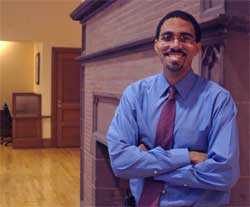A Man with a Mission
You might think that someone starting law school at Yale while working on a doctorate at Teachers College would be sallow, stressed, or simply crushed under a mountain of books.
So how come John King has a spring in his step? Because the Massachusetts Comprehensive Assessment System (MCAS) scores for Roxbury Prep, the charter school King co-founded in 1999, have just come out, and they are once again outstanding-placing his students at or above the levels of those in well-to-do districts such as Belmont and Andover. All of Roxbury's 190 students are Black or Latino, with 73 percent qualifying for the federal free and reduced-price lunch programs. With scores higher than the average for Massachusetts' white students, Roxbury Prep can claim that, for its students, at least, the racial achievement gap-a persistent and marked effect in most school systems-is a myth.
"The racial achievement gap is the most urgent civil rights issue of today," King says. "If you don't have access to a rigorous college-prep education, you are not going to have access to the great opportunities that America has to offer. If we want to achieve genuine equality, we have to have schools providing every kid with the chance to go to college."
King, who was educated in New York City public schools as a child, says that Teachers College fueled his desire to make sure low-income kids of color receive better-quality educations. As he studied for his master's degree in Social Studies, he says, "It became clear that urban schools were not fulfilling their mission." So King decided that he wanted to learn, from a teacher's perspective, what a first-rate education really looks like. He did just that, teaching in New York, Puerto Rico and at a charter school in Boston.
Yet none of these schools fully matched his vision of imparting fundamental learning and learning skills to students before they reach high school. So, with the help of Evan Rudall, who is now at Columbia Law School, King started Roxbury Prep. At the same time, he felt a need for a grounding in solid educational research, which took him back to Teachers College for a doctorate in educational administration in the Inquiry Program headed by Professor Thomas Sobol, former New York State Commissioner of Education.
"It really was the perfect combination," of research and hands-on experience, King says, adding that the program mirrored his own philosophy. Indeed, Roxbury Prep combines a stimulating academic challenge to students with constant communication with parents and guardians. The average school day at Roxbury is more than 20 percent longer than at most public schools, and students have double sessions of English and Math every day. Each student receives regular, detailed progress reports, and parents are apprised of each grade their child earns.
While King allows that "not every school has to look like Roxbury Prep," he nevertheless wants to "get involved in the policy conversation," and that has now led him to law school, as well. The world of education policy, he says, needs to pay more attention to people with educational experience. "No one thinks they're an expert on health care because they've been to a hospital," he says, "but a lot of people think they're education experts because they went to school."
King would like schools to have both more autonomy and more accountability. "Principals and teachers should be able to create a school culture that they believe in and are committed to, and they should be accountable for their results."
While King's focus is on providing better education to the urban poor, he said he's surprised by how many educational issues transcend location and demographics. "When you look through the lens of the curriculum," he says, "we all really do have a lot in common," regardless of a school district's location or socioeconomic makeup.
King has a word of advice for anyone looking to apply for a school charter: "Be intentional about your research process before you do it." He and Rudall looked at dozens of other school systems to figure out "what they were doing that was working, and what was not."
"I always want to be learning about what we could be doing better," he says, "and Teachers College has been a big part of that."
Published Monday, Oct. 11, 2004
